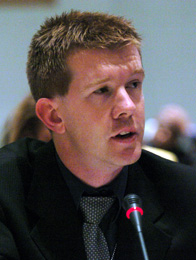|

|
|
|
Ad Hoc Open-ended
Informal Working Group to study issues relating to the conservation
and sustainable use of marine biological diversity beyond areas of
national jurisdiction
13-17 February 2006
| UN
Headquarters, New York
|
Highlights from Wednesday, 15 February
2006
On Wednesday, 15 February, the Ad Hoc Open-ended Informal Working Group of the General Assembly to study issues relating to the conservation and sustainable use of marine biodiversity beyond areas of national jurisdiction (the Working Group) continued discussions on the scientific, technical, economic, legal, environmental and socioeconomic aspects. In the afternoon, delegates discussed key issues and questions requiring more detailed background studies.
|
On aspects of the conservation and sustainable use of marine biodiversity, New Zealand outlined the key emerging themes, such as the need for: integrated oceans management; establishing multi-purpose MPAs; agreeing on a regime on biological, including genetic, resources; involving developing countries; and adopting interim measures to address destructive fishing practices. |
Elva Escobar Briones, Mexico's National Autonomous University (left), made a presentation on international cooperation between developed and developing countries, highlighting the new discovery of asphalt volcanoes in the abyss (center).
On scientific aspects, Arlo Hemphill, Conservation International, prioritized immediate research on and conservation of seamounts, deep and remote coral reefs, continental slope, canyons and cold seeps, and marine cave habitats. He urged delegates to consider the need to invest in data infrastructure for improved support of both research and conservation. |
 |
|
Andrew Brooke, Australia (left) said Australia prioritized: combining fisheries, mining and other data; allowing for scientific comparison of collected data; developing frameworks for RFMOs' cooperation in harmonizing and exchanging data: and undertaking further studies on measures to address IUU fishing and other human impacts on marine biodiversity. Marjo Vierros, Convention on Biological Diversity,
suggested prioritizing research on the distribution of seamounts and other ecosystem functioning in a range of different depths, and on the behavior of marine species. |
| Canadian Side Event: Preliminary Results from the International Expert Workshop on Criteria for Identifying Ecologically or Biologically Significant Areas Beyond National Jurisdiction (December 2005, Ottowa, Canada) |
| Jake Rice, Department of Fisheries and Oceans, Canada |
|